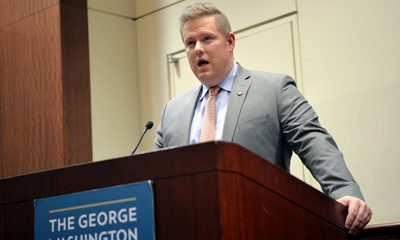National
New GOP chair backs ban on same-sex marriage
Log Cabin is hopeful Priebus will support ‘big tent’ policy

Reince Priebus of Wisconsin was elected the new RNC chair. He has supported the GOP platform language opposing same-sex marriage and also supported a ban on civil unions. (Photo courtesy of Wisconsin GOP)
The head of Log Cabin Republicans said he is hopeful that the newly elected chair of the Republican National Committee, Reince Priebus of Wisconsin, would maintain cordial relations with LGBT Republicans, even though Priebus supports a constitutional ban on same-sex marriage.
Priebus, 38, chair of the Wisconsin Republican Party, defeated controversial RNC Chair Michael Steele and four other candidates in a hotly contested race for the RNC leadership post at an RNC meeting in suburban Maryland on Jan. 14.
In a Jan. 3 debate at the National Press Club in Washington, Priebus, Steele and the three other candidates for the RNC chair position each said they believe marriage should be restricted to a union between a man and a woman.
“I don’t believe that judges can rewrite the Constitution and redraft what marriage is,” Priebus said during the debate. “I think…there’s a sanctity of marriage…I believe my kids and believe children should grow up with one father and a mother if possible,” he said.
He then added, “I don’t believe anybody should be denied dignity in this discussion, everyone should be loved. But at the end of the day, I believe that marriage, through the sanctity of marriage, should be between one man and one woman.”
In an earlier interview broadcast on YouTube with Maggie Gallagher, president of the National Organization for Marriage, the leading group opposing same-sex marriage, Priebus said he supports the Republican Party platform position on marriage, which calls for a constitutional amendment to ban same-sex marriage.
He also noted in his interview with Gallagher, which took place shortly after he entered the race for RNC chair, that he was a strong advocate for the Wisconsin state constitutional amendment banning both same-sex marriage and civil unions. Voters in the state approved that amendment in 2006.
“I was a part of that,” he said. “I was helpful to make sure that that happened…It’s an important issue because I believe marriage is a gift from God and the sanctity of marriage ought to be protected,” he told Gallagher.
“I believe the Defense of Marriage Act is important,” he continued in the interview. And it’s something that certainly as chairman of the Republican National Committee that we ought to be committed to.”
In marked contrast, the Democratic Party platform expresses opposition to both a constitutional ban on same-sex marriage and the Defense of Marriage Act, or DOMA, which it calls for repealing.
DOMA, which Congress passed in 1996, defines marriage under federal law as a union only between a man and a woman. The law prevents same-sex couples married in states that have legalized such unions from receiving any federal benefits or rights related to marriage.
The GOP platform also recognizes “the incompatibility of homosexuality with military service” while the Democratic platform called for the repeal of the “Don’t Ask, Don’t Tell” law barring gays and lesbians from serving openly in the military.
The subject of gays in the military did not come up in the debate among RNC chair candidates or in Gallagher’s interview with Priebus. But in discussing the GOP platform, Priebus told Gallagher, “I have no beef with any part of that platform that’s set forth within the Republican National Committee.”
R. Clarke Cooper, executive director of Log Cabin Republicans, joined other GOP leaders in releasing a statement on the day Priebus was elected RNC chair calling for party unity and inclusion.
“As Chairman Priebus stated, ‘we must come together over common interests. We must unite,’” Cooper said in his statement.
“I look forward to continuing our successful partnership with the Republican National Committee, and urge Chairman Priebus to continue the Committee’s strong record of coalition-building, which was an important part of GOP success in 2010,” he said.
Cooper said Log Cabin did not take sides in the RNC chair race. He said he personally supported one of the candidates but declined to say which one.
GOProud, a national organization representing “gay conservatives and their allies,” called Priebus’ election as party chair “a good day for conservatives and for the Republican Party.”
Christopher Barron, chair of GOProud’s board, said the group worked hard for Steele’s defeat but did not say if it backed another candidate. GOProud was among a number of conservative groups that criticized Steele for making a statement last year saying the U.S. could not achieve its objectives in the war in Afghanistan.
“Michael Steel’s tenure as chairman can only fairly be characterized as an unmitigated disaster,” Barron said “Were it not for the hard work of outside groups, who were forced to step in to fill the void left by an ineffective RNC, success at the ballot box in November would not have happened.
Robert Kabel, the gay chair of the D.C. Republican Committee, had a far different view on Steele, saying the now ex-GOP chair did an overall good job.
Kabel said he backed Steele’s re-election bid, saying Steele was “highly supportive” of the D.C. Republican Party and of Kabel’s role as the nation’s only out gay leader of a state or local Republican Party committee.
Kabel, who is a member of the RNC, said he voted for former RNC official Maria Cino, another of the candidates competing for the chair post, when Steele dropped out of the race after trailing Priebus in the fourth round of voting.
Cooper noted that Steele had welcomed Log Cabin and gay Republicans in general into the RNC’s fold during his two-year tenure as RNC chair and hired at least one out gay staffer to work at the RNC’s Coalitions Department, which reached out to Republican constituency groups like College Republicans, Young Republicans, and Log Cabin.
Kabel, who like Cooper, declined to identify the gay staffer, said the staffer is among nearly a dozen RNC staff members that Priebus fired or who resigned during his first week in office.
Both said the firings and resignations were part of the normal personnel changes that take place whenever a new party chair takes office.
The Hill newspaper reported that Priebus dismissed most of the staff that had been hired by Steele to work on the 2012 Republican National Convention.
“They recognized the gay community, they were very open to Log Cabin and they were really delighted when Clarke Cooper was finally selected as the new Log Cabin director,” Kabel said of the RNC Coalitions Department under Steele’s tenure.
Cooper said he could not say for sure but he expected Priebus to keep the Coalitions Department in place, although he said the new party chair might rename it or change its place within the RNC structure.
A staff member with the RNC’s press office, who identified himself only as Michael, said he would seek to obtain a response to a Blade inquiry about Priebus’ plans for the Coalitions Department and its interaction with Log Cabin. The staffer did not get back by press time.
Priebus led in the balloting in a protracted election in which the 168-member RNC was unable to deliver the 85 votes needed to elect a chair until Priebus finally obtained 97 votes on the seventh round of voting.
In addition to Steele, the other candidates in the race were Cino, a former Bush administration official who had been friendly to Log Cabin; Ann Wagner of Missouri; and Saul Anuzis of Michigan.
In a related development, on the same day Priebus won his race for RNC chair, the RNC elected D.C. resident and longtime Republican activist Tony Parker as RNC treasurer, which is considered the second most important post at the RNC. Parker has held the position of Republican National Committeeman from D.C. His views on LGBT issues could not be immediately determined.
On Jan. 6, the D.C. Republican Committee voted unanimously to re-elect Kabel as chair for another two-year term.
Pennsylvania
Malcolm Kenyatta could become the first LGBTQ statewide elected official in Pa.
State lawmaker a prominent Biden-Harris 2024 reelection campaign surrogate

Following his win in the Democratic primary contest on Wednesday, Pennsylvania state Rep. Malcolm Kenyatta, who is running for auditor general, is positioned to potentially become the first openly LGBTQ elected official serving the commonwealth.
In a statement celebrating his victory, LGBTQ+ Victory Fund President Annise Parker said, “Pennsylvanians trust Malcolm Kenyatta to be their watchdog as auditor general because that’s exactly what he’s been as a legislator.”
“LGBTQ+ Victory Fund is all in for Malcolm, because we know he has the experience to win this race and carry on his fight for students, seniors and workers as Pennsylvania’s auditor general,” she said.
Parker added, “LGBTQ+ Americans are severely underrepresented in public office and the numbers are even worse for Black LGBTQ+ representation. I look forward to doing everything I can to mobilize LGBTQ+ Pennsylvanians and our allies to get out and vote for Malcolm this November so we can make history.”
In April 2023, Kenyatta was appointed by the White House to serve as director of the Presidential Advisory Commission on Advancing Educational Equity, Excellence and Economic Opportunity for Black Americans.
He has been an active surrogate in the Biden-Harris 2024 reelection campaign.
The White House
White House debuts action plan targeting pollutants in drinking water
Same-sex couples face higher risk from environmental hazards

Headlining an Earth Day event in Northern Virginia’s Prince William Forest on Monday, President Joe Biden announced the disbursement of $7 billion in new grants for solar projects and warned of his Republican opponent’s plans to roll back the progress his administration has made toward addressing the harms of climate change.
The administration has led more than 500 programs geared toward communities most impacted by health and safety hazards like pollution and extreme weather events.
In a statement to the Washington Blade on Wednesday, Brenda Mallory, chair of the White House Council on Environmental Quality, said, “President Biden is leading the most ambitious climate, conservation, and environmental justice agenda in history — and that means working toward a future where all people can breathe clean air, drink clean water, and live in a healthy community.”
“This Earth Week, the Biden-Harris Administration announced $7 billion in solar energy projects for over 900,000 households in disadvantaged communities while creating hundreds of thousands of clean energy jobs, which are being made more accessible by the American Climate Corps,” she said. “President Biden is delivering on his promise to help protect all communities from the impacts of climate change — including the LGBTQI+ community — and that we leave no community behind as we build an equitable and inclusive clean energy economy for all.”
Recent milestones in the administration’s climate policies include the U.S. Environmental Protection Agency’s issuance on April 10 of legally enforceable standard for detecting and treating drinking water contaminated with polyfluoroalkyl substances.
“This rule sets health safeguards and will require public water systems to monitor and reduce the levels of PFAS in our nation’s drinking water, and notify the public of any exceedances of those levels,” according to a White House fact sheet. “The rule sets drinking water limits for five individual PFAS, including the most frequently found PFOA and PFOS.”
The move is expected to protect 100 million Americans from exposure to the “forever chemicals,” which have been linked to severe health problems including cancers, liver and heart damage, and developmental impacts in children.
An interactive dashboard from the United States Geological Survey shows the concentrations of polyfluoroalkyl substances in tapwater are highest in urban areas with dense populations, including cities like New York and Los Angeles.
During Biden’s tenure, the federal government has launched more than 500 programs that are geared toward investing in the communities most impacted by climate change, whether the harms may arise from chemical pollutants, extreme weather events, or other causes.
New research by the Williams Institute at the UCLA School of Law found that because LGBTQ Americans are likelier to live in coastal areas and densely populated cities, households with same-sex couples are likelier to experience the adverse effects of climate change.
The report notes that previous research, including a study that used “national Census data on same-sex households by census tract combined with data on hazardous air pollutants (HAPs) from the National Air Toxics Assessment” to model “the relationship between same-sex households and risk of cancer and respiratory illness” found “that higher prevalence of same-sex households is associated with higher risks for these diseases.”
“Climate change action plans at federal, state, and local levels, including disaster preparedness, response, and recovery plans, must be inclusive and address the specific needs and vulnerabilities facing LGBT people,” the Williams Institute wrote.
With respect to polyfluoroalkyl substances, the EPA’s adoption of new standards follows other federal actions undertaken during the Biden-Harris administration to protect firefighters and healthcare workers, test for and clean up pollution, and phase out or reduce use of the chemicals in fire suppressants, food packaging, and federal procurement.
Maine
Maine governor signs transgender, abortion sanctuary bill into law
Bomb threats made against lawmakers before measure’s passage

BY ERIN REED | On Tuesday, Maine Gov. Janet Mills signed LD 227, a sanctuary bill that protects transgender and abortion providers and patients from out-of-state prosecution, into law.
With this action, Maine becomes the 16th state to explicitly protect trans and abortion care in state law from prosecution. This follows several bomb threats targeting state legislators after social media attacks from far-right anti-trans influencers such as Riley Gaines and Chaya Raichik of Libs of TikTok.
An earlier version of the bill failed in committee after similar attacks in January. Undeterred, Democrats reconvened and added additional protections to the bill before it was passed into law.
The law is extensive. It asserts that gender-affirming care and reproductive health care are “legal rights” in Maine. It states that criminal and civil actions against providers and patients are not enforceable if the provision or access to that care occurred within Maine’s borders, asserting jurisdiction over those matters.
It bars cooperation with out-of-state subpoenas and arrest warrants for gender-affirming care and abortion that happen within the state. It even protects doctors who provide gender-affirming care and abortion from certain adverse actions by medical boards, malpractice insurance, and other regulating entities, shielding those providers from attempts to economically harm them through out-of-state legislation designed to dissuade them from providing care.
You can see the findings section of the bill here:
The bill also explicitly enshrines the World Professional Association of Transgender Health’s Standards of Care, which have been the target of right-wing disinformation campaigns, into state law for the coverage of trans healthcare:
The bill is said to be necessary due to attempts to prosecute doctors and seek information from patients across state lines. In recent months, attorneys general in other states have attempted to obtain health care data on trans patients who traveled to obtain care. According to the U.S. Senate Finance Committee, attorneys general in Tennessee, Indiana, Missouri, and Texas attempted to obtain detailed medical records “to terrorize transgender teens in their states … opening the door to criminalizing women’s private reproductive health care choices.”
The most blatant of these attempts was from the attorney general of Texas, who, according to the Senate Finance Committee, “sent demands to at least two non-Texas entities.” One of these entities was Seattle Children’s Hospital, which received a letter threatening administrators with arrest unless they sent data on Texas patients traveling to Seattle to obtain gender-affirming care.
Seattle Children’s Hospital settled that case out of court this week, agreeing to withdraw its Texas business registration in return for Texas dropping its investigation. This likely will have no impact on Seattle Children’s Hospital, which has stated it did not treat any youth via telemedicine or in person in Texas; the hospital will be able to continue treating Texas youth who travel outside of Texas to obtain their care. That settlement was likely compelling due to a nearly identical law in Washington that barred out-of-state investigations on trans care obtained solely in the state of Washington.
The bill has faced a rocky road to passage. A similar bill was debated in January, but after coming under intense attack from anti-trans activists who misleadingly called it a “transgender trafficking bill,” the bill was voluntarily withdrawn by its sponsor.
When LD 227 was introduced, it faced even more attacks from Gaines and Libs of TikTok. These attacks were followed by bomb threats that forced the evacuation of the legislature, promising “death to pedophiles” and stating that a bomb would detonate within a few hours in the capitol building.
Despite these threats, legislators strengthened both the abortion and gender-affirming care provisions and pressed forward, passing the bill into law. Provisions found in the new bill include protecting people who “aid and assist” gender-affirming care and abortion, protections against court orders from other states for care obtained in Maine, and even protections against adverse actions by health insurance and malpractice insurance providers, which have been recent targets of out-of-state legislation aimed at financially discouraging doctors from providing gender-affirming care and abortion care even in states where it is legal.
See a few of the extensive health insurance and malpractice provisions here:
Speaking about the bill, Gia Drew, executive director of Equality Maine, said in a statement, “We are thrilled to see LD 227, the shield bill, be signed into law by Gov. Mills. Thanks to our pro equality and pro reproductive choice elected officials who refused to back down in the face of disinformation. This bill couldn’t come into effect at a better time, as more than 40 percent of states across the country have either banned or attempted to block access to reproductive care, which includes abortions, as well as transgender healthcare for minors. Thanks to our coalition partners who worked tirelessly to phone bank, lobby, and get this bill over the finish line to protect community health.”
Destie Hohman Sprague of the Maine Women’s Lobby celebrated the passage of the bill despite threats of violence, saying in a statement, “A gender-just Maine ensures that all Mainers have access to quality health care that supports their mental and physical wellbeing and bodily autonomy, including comprehensive reproductive and gender-affirming care. We celebrate the passage of LD 227, which helps us meet that goal. Still, the patterns of violence and disinformation ahead of the vote reflected the growing connections between misogyny, extremism, and anti-democratic threats and actions. We must continue to advocate for policies that protect bodily autonomy, and push back against extremist rhetoric that threatens our states’ rights and our citizens’ freedoms.”
The decision to pass the legislation comes as the Biden administration released updated HIPAA protections that protect “reproductive health care” from out-of-state prosecutions and investigations.
Although the definition of “reproductive health care” is broad in the new HIPAA regulations, it is uncertain whether they will include gender-affirming care. For at least 16 states, though, gender-affirming care is now explicitly protected by state law and shielded from out-of-state legislation, providing trans people and those seeking abortions with protections as the fight increasingly crosses state lines.
****************************************************************************

Erin Reed is a transgender woman (she/her pronouns) and researcher who tracks anti-LGBTQ+ legislation around the world and helps people become better advocates for their queer family, friends, colleagues, and community. Reed also is a social media consultant and public speaker.
******************************************************************************************
The preceding article was first published at Erin In The Morning and is republished with permission.
-

 State Department2 days ago
State Department2 days agoState Department releases annual human rights report
-

 Maryland4 days ago
Maryland4 days agoJoe Vogel campaign holds ‘Big Gay Canvass Kickoff’
-

 Politics3 days ago
Politics3 days agoSmithsonian staff concerned about future of LGBTQ programming amid GOP scrutiny
-

 The White House1 day ago
The White House1 day agoWhite House debuts action plan targeting pollutants in drinking water















